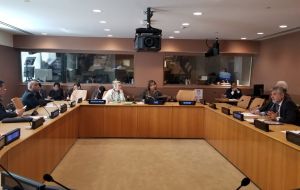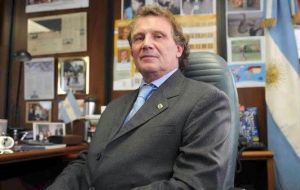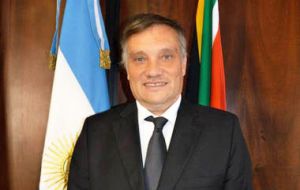MercoPress. South Atlantic News Agency
Argentina/Falklands fisheries talks: what happened and what can be expected
 On Monday 20 January, the South Atlantic Scientific Committee was scheduled to meet in Buenos Aires, one of the regular meetings agreed
On Monday 20 January, the South Atlantic Scientific Committee was scheduled to meet in Buenos Aires, one of the regular meetings agreed  Falklands officials had not been informed of its suspension but in the same week Daniel Filmus was in New York talking with UN C24
Falklands officials had not been informed of its suspension but in the same week Daniel Filmus was in New York talking with UN C24  Likewise ambassadors Carlos Sersale and Carlos Foradori, in London and Geneva were recalled to Buenos Aires
Likewise ambassadors Carlos Sersale and Carlos Foradori, in London and Geneva were recalled to Buenos Aires  The new approach was outlined by ambassador Javier Figueroa, close associate of Filmus, but it has yet to be approved by chancellor Sola and president Fernandez
The new approach was outlined by ambassador Javier Figueroa, close associate of Filmus, but it has yet to be approved by chancellor Sola and president Fernandez Last week there was intense diplomatic activity regarding the Falkland Islands: the meeting of the Fisheries Subcommittee to be held in Buenos Aires on Monday 20 was suspended; the ambassadors before Great Britain and before the international organizations in Geneva, Renato Sersale di Cerisano and Carlos Foradori, were displaced and the secretary of Matters Related to the Falkland Islands, Daniel Filmus, made his presentation in New York in the Decolonization Committee, urging that a negotiation instance be promoted from the UN.
The Argentine news agency revistapuerto.com.ar published an interpretation of what could have happened, and what can be expected in the future from the new administration of president Alberto Fernández, who has anticipated his government is determined to remove UK from the “comfort zone” it enjoyed in South Atlantic issues under his antecessor, Mauricio Macri.
In 2016, during the presidency of Mauricio Macri and with Susana Malcorra as chancellor, the Argentine government signed a joint communiqué with Great Britain that, in addition to generating rejections from the opposition and part of the ruling party, left as a result flights from Brazil to the Falklands with scale in Cordoba; the identification of 115 soldiers buried in the Islands and the reactivation of the Scientific Subcommittee of the South Atlantic Fisheries Commission. The latter was created in 1990 and deactivated during the Kirchner mandates.
Since the approval of the so-called Foradori-Duncan Agreement -those who signed it - the Subcommittee resumed the exchange of scientific data and joint scientific surveys were carried out in 2019, to assess the squid in February and the Southern blue whiting last September.
Facing a new squid season, the Subcommittee had to meet again Monday 20th January but the meeting was suspended by the new authorities. Chancellor Felipe Solá and the new secretary for Matters Related to the Falkland Islands, Antarctica and South Atlantic Islands, Daniel Filmus, decided to suspend it.
At the same time, the ambassador in London, Carlos Sersale and the ambassador to international organizations in Geneva, Carlos Foradori, were called to Buenos Aires and removed from their positions through two decrees published in the Official Gazette on January 22. Likewise on Thursday 23 Filmus met in New York with the members of the United Nations Special Committee on Decolonization, C24.
As a consequence there were rumors of the definitive dismantling of the Scientific Subcommittee on Fisheries, a theory that was backed by the suspension of the meeting, but allegedly according to Argentine sources it could be redirected to a more ambitious “ocean policy” extending all the way to Antarctica.
Javier Figueroa, ambassador to Cuba since 2016 and who was an official of the Falklands Secretariat since its creation and a man very close to Daniel Filmus, two months ago wrote an extensive article about the relationship between the Falklands and the fisheries for a Panamanian magazine which could give an idea of the guidelines that are intended to be adopted for to the subject by the Secretariat.
“A look that frames the sovereignty dispute in a comprehensive political vision of the South Atlantic and Antarctica is not usual. That is the context, in which we should design our policy. Malvinas is a chapter of a broader novel, which is the construction of an ocean policy for our country,” Figueroa wrote in Panamanian magazine.
For the ambassador and advisor of Daniel Filmus visualizing Falklands from another perspective, linking “the Malvinas issue to other agendas such as science or marine conservation”, would allow developing policies that strengthen Argentina's negotiating position and would be an effective development tool and of strategic presence.
To do this, he says, alliances and networks must be woven by topics with relevant actors, whether they are States of the South Atlantic basin or key actors in environmental, scientific, fisheries agendas, even extending alliances with specialized organizations and NGOs.
“Any large-scale program for the South Atlantic requires establishing consultation and articulation mechanisms between the different competent institutions, which can pursue different objectives. At the same time, it is essential to avoid the atomization of efforts, aiming at an integrated management. This coordination must also include the provinces with maritime coast, and those institutions and state organizations or not that carry out activities in our southern maritime spaces,” summarizes Figueroa.
In that context, he puts in a key place the role of the province of Tierra del Fuego and the port of Ushuaia: “The delayed construction of an Antarctic logistics hub, the concentration of national Antarctic scientific institutions in the province and the opening to the national private sector for the provision of Antarctic logistics and tourism services not only has a geopolitical logic, but will generate quality resources and jobs.”
The speech and praxis of a legal and conservative diplomatic nature, says Figueroa, “has led us, for example, to marginalize us in marine forums” and the pendulum attitudes to a situation of disadvantage before the counterpart, situations that would be avoided, he says, “if we assume that the conflict of sovereignty is one more point of a broader agenda.”
Within the Malvinas Secretariat, the creation of a special department to address the problem of the South Atlantic is considered, but its concretion or the development that it can achieve will ultimately depend on the political position that President Alberto Fernández decides to take on the Falklands issue. (FIS/MP)




Top Comments
Disclaimer & comment rules-

Read all commentsHello Narnia.
Jan 30th, 2020 - 10:27 am +2'It is a well-established practice, accepted as law that title over natural resources is to follow that over territory: accordingly, the sovereign subject enjoys the exclusive right to dispose of the natural wealth of the area which it exercises sovereignty. (UN Stockholm Declaration 1972, Principle 21 & UN Rio Declaration 1992, Principle 2 Declarations on the Human Environment).
TTFN
Commenting for this story is now closed.
If you have a Facebook account, become a fan and comment on our Facebook Page!